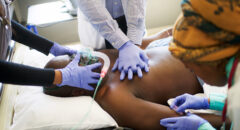
Among the various categories of CVD, coronary heart disease (CHD) is the largest single cause of death in the American population.
When African Americans are compared to whites in this category, it is seen that blacks have a higher death rate in the younger age groups but a lower rate at older ages. Overall, CHD death rates in 1995 for black males were 133.1 per 1000 compared to 124.4 per 1000 for white males, or 7 percent higher in blacks; the rates for black women were more than 35 percent higher than for white women (81.6 versus 60.3 per 1000, respectively).
Heart attack event rates are higher for non-black men ages 65-74, but the rate is more than twice as high for black as compared to white women in that same age group. New and recurrent heart attacks occur more frequently in African Americans men than in white men only in the 75-84 age category; in younger as well as in older age groups, white men have more heart attacks than do African Americans men.
The number of studies of CHD in African Americans remains sparse, and except CHD in persons with no baseline history of the disease was higher for African Americans women than for white women ages 25-74 but was lower for African American men than for white men at all ages. Since risk factor levels tend to be higher in African Americans, reduction of these multiple risk factors in this group could lead to very dramatic reductions in CHD incidence if the risks were reduced only to the levels present in whites.
This fact represents one of the most hopeful areas in disease management; since CHD age-adjusted fatality rates remain higher for
African Americans than for whites, the major killer of African Americans can be significantly controlled through limitation of risk factors such as hypertension, diabetes, and cigarette smoking. Reduction of CHD risk factors in African American men and women just to the levels seen in whites should result in a considerable saving of lives and represents one of the best possible
payoffs to public health efforts.
Recently, the National Heart, Lung and Blood Institute (NHLBI) and the Officeepidemiological studies, over the past two decades, randomized cardiovascular research investigations providing data on CHD morbidity and mortality have included only 2-9 per cent African American patients in their study populations.
Other investigations which should shed more light on cardiovascular disease in African Americans are the Antihypertensive and Lipid-lowering Treatment to Prevent Heart Attack Trial (ALLHAT), and the African American Study of Kidney Disease (AASK). These trials are still in progress.







